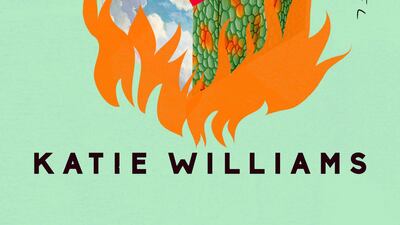Happiness is a nebulous concept yet has become vital in modern life. Capitalist agenda and even technological advances have strived to bring us closer to this chimerical pursuit of happiness. How this search is commodified is illustrated in Katie Williams’s debut novel where a tech corporation, Apricity, provides a one-stop solution to a “personalised contentment plan”.
The book takes place in the near-future and often reads like an extended episode of Black Mirror, with its arresting combination of dark humour and lacerating prescience. However, what makes this story stand a class apart from the recent spate of science fiction about the abstruse nature of our wired life is the attention paid to the humane side of it. Williams's penetrating insight into what makes us tick and the ways in which happiness, or the lack of it, sustains our lives is rapier-sharp and perceptive.
Protagonist Pearl is a dedicated technician at the hot new tech corporation Apricity. She embodies the perfect unflappable nature and level-headedness required for an employee at a company such as this one.
For her, unhappiness is a minor inconvenience “more like the wisp of smoke from a snuffed candle” than an existential riddle she needs to solve. Her identity as an unruffled employee and a person has become blurred to the extent that when she reaches to say something to console a client, apart from the memorised lines from the manual, she realises she had nothing, “The landscape was razed, barren.”
Pearl is a single mother to a teenage boy, Rhett, who has struggled with life-threatening anorexia in the recent past. Pearl is concerned, but taciturn as a mother, and the awkwardly reticent mother-son dynamic is one of the strongest points of the story. Williams gives a rare, nuanced peek into a relationship where not much is said, reminiscent of the convoluted mother-son relationship in Lionel Shriver's We Need To Talk About Kevin.
Pearl usually goes by the book, but makes an exception for her son when she complains about her clients to him after realising that “other people’s sadness was a balm for her son’s own powerful and inexplicable misery”. Rhett, on the other hand, is nursing his own grievances against his mother who forced invasive treatment upon him while he was starving himself, which he equates to rape.
The story then continually zooms in on other characters in Pearl's orbit, with Apricity being the common denominator in these interwoven storylines. Her ex-husband, Elliot, is a self-absorbed artist whose new wife, Val, is a freelance namer – a job that sounds frivolous, but actually involves lots of attention to detail. While Pearl uses Apricity to recommend a cure for their unhappiness to wealthy, but perpetually discontent clients, Elliot uses Apricity for his performance art. After mining through several Apricity reports, he selects seven recommendations to act out for every day of the week. These acts include generic things like "eat honey", "wrap yourself in softest fabric", but Elliot's satirical take on these means taking these recommendations to the extreme. The goal is to make himself "sick on happiness".
The book also gives insight into what happiness means to different people. For Carter, Pearl’s boss, the machine gives him recommendations on how to be more powerful, which to him is synonymous with happiness. Pearl is fixated on Rhett’s unhappiness, which causes distress and anxiety in her own life. He refuses to sit for an Apricity test, so Pearl decides to take matters into her own hands and cure his sadness. But can one administer the antidote to unhappiness without knowing the toxin?
The kaleidoscopic narrative provides us a glimpse into the lives of myriad characters related to Pearl and Rhett. Written in a style that is contemporary and engaging, this novel is a profound meditation on whether contentment is vital for existing. This is a buoyant portrait of imperfect relationships of people racked with guilt, anxiety and sorrow, but still somehow drifting along, making their way in the world.
Tell the Machine Goodnight reads like a set of interlinked short stories, each related to how Apricity affects people's lives. However, at times, this juxtaposition impedes the narrative flow by overloading the readers with too many fragmented storylines. Another divisive narrative choice the writer makes is not neatly tying up all the minor storylines at the end. That being said, the writing style is so effortlessly lucid that the book inexorably draws to a satisfying conclusion.
Williams is remarkable at tenderly recognising human folly and focusing on the small, specific details of human interactions. After Rhett moves away for college, he receives frequent phone calls from his mum, which is described candidly, “As much as you can stand, as little as she can.”
In one of the initial chapters, Pearl recalls how when she was hired for Apricity it was because her boss shrewdly observed that “You store your happiness in a warehouse, not a coin pouch. It can be bought cheap!” The narrative is peppered with gems like these, which make this debut an invigorating read. It also makes one think whether happiness is as tangible as eating tangerines, getting a dog or taking a trip alone.
Tell the Machine Goodnight is an exceptionally written and thought-provoking debut novel all about the elusive nature of happiness. The urgency of speculative fiction that Williams uses is seamlessly combined with the intricately poignant and philosophical tone of literary fiction in this nourishing read.
__________________________
Read more:
My favourite reads: Karen Bowden
Why Nayrouz Qarmout sees Palestinian women as more than passive victims
Reham Khan's tell-all memoir tells one side of the Imran Khan story
__________________________

